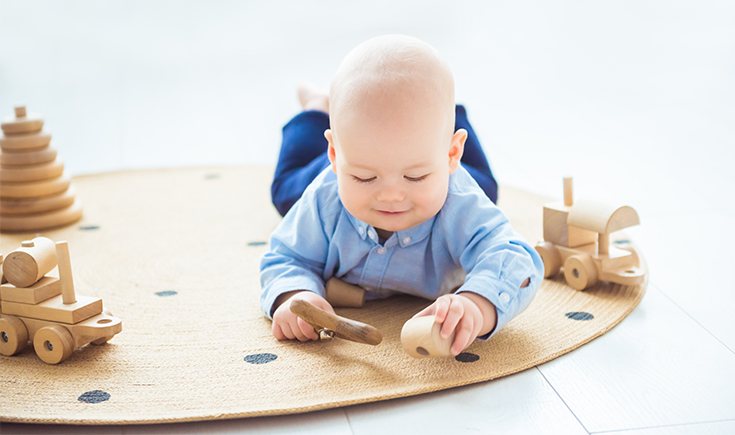

Does your baby want to be in your arms all day (and night!) long? Do they get cranky when you put them down? Is your baby happier propped up in a seat than lying down on a mat to play? Of course you’re not going to deny your baby cuddles and comfort when they need it, but giving your baby space and time to play independently is important for both you and your baby.
Let’s first look at the benefits of independent play:
- Play isn’t just filling in time – it has a strong learning component to it
- Promotes healthy physical, social, cognitive, and emotional growth
- Provides opportunities of activity without overstimulation
- Sets the stage for imagination, creativity, and future quiet time
- Allows your baby to master new skills during awake times (rather than in the cot at night!)
Let’s not forget the benefits for the rest of the family. It gives you the chance to meet your own needs, as well as anyone else’s in your household. Now you know why it’s so important, here are the steps to stop constantly entertaining or holding your baby.
How to encourage your baby to play independently
All babies have different temperaments, but even the clingiest of babies can learn to play independently. A good age to start encouraging solo play is from about five months, as at this age babies can generally hold their head up, and also manipulate toys. If your baby has become accustomed to being entertained, there will be an adjustment period as they adapt to enjoying play with less of your input.
The following suggested steps are gentle and gradual:
- Make sure your baby is fed, rested, and has had plenty of time of play and connection with you or another caregiver. You want their love cup to be full. Use the time when you’re changing nappies, bathing, and feeding to engage with your baby in loving and fun ways.
- Be close at first. Tell your baby that you’re going to lie them down, and then place them on their back on their mat. Put a few simple developmentally-appropriate, open-ended toys around them within reach. There’s no need to move any toys, or talk about them. Just relax, breathe, and be patient and quiet while your baby looks around. If your baby gets upset, you could lie them horizontally on your lap instead. It’s important not to rush into sitting babies up before they’re developmentally ready (read more on that here).
- If your baby seems interested in the toys (or even their hands), stay close and simply observe. Your baby will sense if you have an agenda or you’re trying to rush the process. Try to let go, and just let your baby ‘be’. Babies (and children) prefer a much slower pace than adults.
- If your baby starts to fuss, they are probably complaining about the change, rather than letting you know they’re uncomfortable or unhappy. Talk to your baby and acknowledge their communication. ‘I hear you, I’m right here with you’, ‘This is different to how we usually play, but I’m here’.
- If their complaints start to escalate, and your acknowledgements and reassurance doesn’t help, you could ask them if they need a little break, and then offer to pick them up if they seem to respond yes. Stay on the floor though, and once they start to resettle, you could then try again, asking them if they’d like to play.
- Do this each day, starting with 5-10 minutes a day, and then gradually extend the time. You may need to stay beside them for a while as they grow more secure in exploring their environment independently, but you can gradually move a little further away. Never leave your baby unsupervised, so stay in the same room, or bring your baby to the room where you’re doing other things. And always on a mat on the floor rather than a swing or seat, so they’re free to move.
What are some good toy suggestions for independent play?
When it comes to toys, you can keep it minimal, and even just use things from around the house (just ensure there are no small parts), such as:
- A baby’s hands are all the fun they need early on
- Fabric and scarves are colourful, tactile, fun, and easy to grab and manipulate
- Raid your kitchen cupboards for containers, colanders, utensils, and cups
- An old purse, a hairbrush, a packet of wipes, an empty lotion pot
- You’ll find more ideas and inspiration in What is the Montessori approach for babies?
Janet Lansbury, How to Stop Entertaining Your Baby
Babywise.Life, Top Benefits of Independent Play & How To Begin
What to Expect, 7 Ways to Encourage Your Baby to Play Solo























